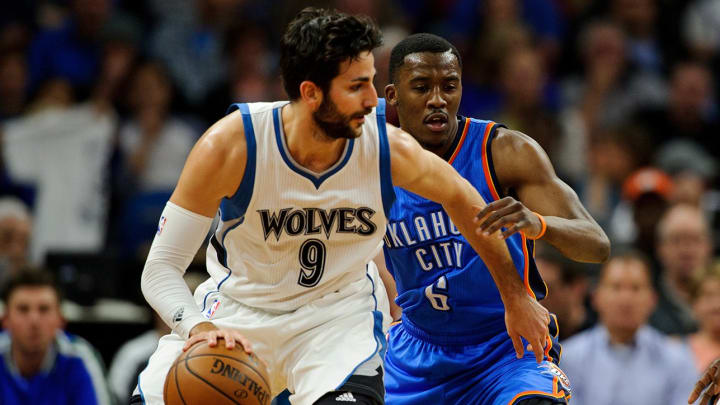Trade Grade: Ricky Rubio Deal Doesn't Resolve Jazz's PG Issues

With All-Star forward Gordon Hayward’s free agency set to take center stage in the coming days, the Jazz have acquired point guard Ricky Rubio from the Timberwolves in exchange for a protected first-round pick, according to multiple reports.
Utah will receive the 26-year-old Rubio, who averaged 11.1 PPG and 9.1 APG last season, and send Oklahoma City’s 2018 first-round pick, protected from No. 1 to No. 14, to Minnesota.
Let’s grade the trade.
Utah: B+
The Jazz have been cycling and cycling in search of a long-term answer at point guard, and this move only continues that process rather than resolving it. After Trey Burke flamed out and Dante Exum’s NBA launch got sidetracked by injury, Utah sent a first-round pick to Indiana for George Hill last summer. With Hill (16.9 PPG, 4.2 APG) now set to hit free agency in search of a big raise after a strong but injury-plagued season, the Jazz have taken a proactive step to acquire a proven starting-quality point guard rather than handing over the keys to Exum or their other incumbent backups. The motivation for this thinking is surely influenced by the need to pitch Hayward. It is, after all, much easier to sell an established All-Star with numerous suitors on re-signing a long-term contract without a gaping hole at the one.
Trade Grades: Wolves Fleece Bulls In Jimmy Butler Blockbuster
In an ideal world, a trade like this should work whether or not Hayward ultimately decides to return, and this one should fit the bill either way. Rubio is a woefully ineffective shooter, but he is a strong individual defender who should fit in well to the Jazz’s defense-first approach and his excellent 3.4 assist-to-turnover ratio will help his new team maximize its offensive opportunities while playing its controlled, slow-down style.
Simply put, he’s more proven than any of Utah’s non-Hill options and he’s under contract at average starter money ($14.3 million next season and $14.8 million in 2018-19). As far as placeholders go, Rubio is not prohibitively expensive in terms of salary or length, and he bears no major red flags from a personality standpoint. Although he missed most of the 2014-15 season due to injury, he’s moved on to log 2,300+ minutes in each of the last two seasons and he’s coming off of a career year. He’s at no risk of injury-related decline.
Setting salaries aside, Hill is preferable to Rubio given his shooting ability and his willingness and comfort ceding lead ball-handling duties to Utah’s wings. But convincing Hill to stay, being able to afford him and Hayward’s decision all complicate this head-to-head preference. By trading for Rubio early, Utah has mitigated the damage from its worst-case scenario–losing both Hayward and Hill–and improved its positioning for the Hayward derby.
2017 NBA free agent tracker: Follow every move
Jazz GM Dennis Lindsey made the right call on the pick terms by passing on the Thunder’s protected first-round pick to the Timberwolves. Let’s say Hayward walks, which is a realistic possibility at this point. That defection could easily send Utah back into the lottery given his central offensive role and all-around skillset. Agreeing to part with their own pick, even if it was protected, could have limited the Jazz’s options next year and beyond. In a worst-case scenario, the Jazz could have been stuck without a 2018 first-round pick if they had to send their own pick to the Timberwolves and the Thunder’s protected pick didn’t convey. Now, they can simply control their own pick without worrying about how Oklahoma City’s season is going.
It’s also worth pointing out that the Jazz acquired the Thunder’s pick in a 2015 trade involving Enes Kanter, who was months away from a major free-agency payday. Turning three months of Kanter into two years of Rubio is a clean asset-management win.
Minnesota: B-
The Timberwolves have been shopping Rubio for years, seemingly always in search of a better option than the good-but-not-great Spaniard who has never quite lived up to his pre-draft hype. Their trade for Jimmy Butler seemingly closed the door on Rubio’s time in Minnesota, as starting three shaky perimeter shooters in Rubio (career 32% from deep), Butler (career 34%) and Andrew Wiggins (career 33%) was going to be untenable.
NBA Social Rankings: Who Won The Week?
Minnesota, which also parted with second-year point guard Kris Dunn to acquire Butler, will now turn its attention to the free agency market in search of a new stating floor general. Within minutes of the Rubio deal leaking, the likes of Hill, Teague, Kyle Lowry and Jrue Holiday were buzzing across Twitter as possible replacement options. All represent upgrades relative to Rubio and all project to be meaningfully more expensive, suggesting that the Timberwolves are pursuing their first playoff trip since 2004 with guns blazing and cash flying.
The pick isn’t really anything to write home about. If Russell Westbrook stays healthy, the pick almost certainly lands in the 16-22 range. If the reigning MVP misses any meaningful stretch of time next year, the Timberwolves, who owe their own lottery-protected first to the Hawks next year, will have to wait longer to cash in their asset.
